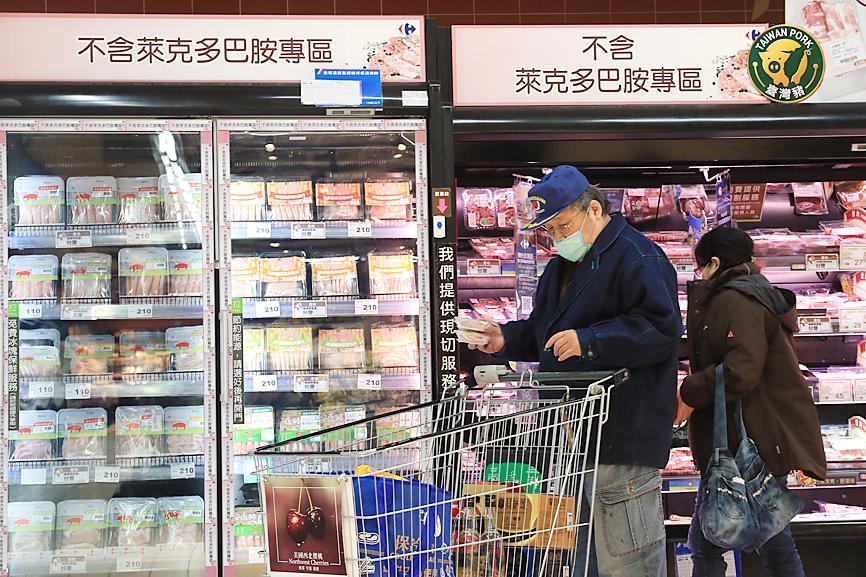Allowing the importation of pork with ractopamine residue is a trade matter, not a safety issue, an Executive Yuan official said yesterday, adding that no health problems have been reported since the ban was lifted.
The official, speaking on condition of anonymity, made the remarks ahead of the Dec. 18 referendum, which includes a question asking voters if they agree that the government should ban the importation of pork products containing ractopamine residue.
The Democratic Progressive Party (DPP) is urging the public to vote “no” on the referendum question, which was initiated by Chinese Nationalist Party (KMT) Legislator Lin Wei-chou (林為洲).

Photo: CNA
The official said that 109 countries allow imports of pork and beef containing safe levels of ractopamine residue, including Japan and the 10 other members of the Comprehensive and Progressive Agreement for Trans-Pacific Partnership (CPTPP).
No health problems have been reported since Taiwan nine years ago allowed the importation of beef containing safe levels of ractopamine residue, the official said, adding that the issue is a trade matter in which Taiwan must reciprocate in bilateral trade with other countries.
If Taiwan does not follow international rules, based on science and safety standards, it could face problems joining the CPTPP and other regional trade organizations, the official said.
DPP Legislator Wang Ting-yu (王定宇) on Friday wrote on Facebook that a Taichung City Government Web site, which shows the results of ractopamine testing, listed only beef products as containing the substance, the importation of which began under former president Ma Ying-jeou (馬英九) of the KMT.
“Just in Taichung, tests found that 70 shops had beef products with ractopamine at levels within international safety standards. This proves that it is not a food safety issue. It is more important to open up for beef and pork imports with safe levels of ractopamine,” Wang wrote. “This way we can secure more favorable terms for our export economy, while helping Taiwan join the CPTPP and bolster Taiwan-US relations.”
On the other hand, KMT Legislator Chiang Wan-an (蔣萬安) yesterday launched a campaign in Taipei titled “Food Safety First,” in which he said that 60.9 percent of Taiwanese opposed importing “pork containing ractopamine” in a survey by Apollo Co.
Sixty-six percent of respondents said they would vote in the referendum, and 86.5 percent said that clear labeling for “pork containing ractopamine” is needed, he said.
“These numbers show the public’s concern for food safety. They have no faith in the government’s current measures. People are also angry at the ruling party for misleading them in painting opposition to ‘ractopamine pork’ as opposition to ‘US pork,’” he said.

‘DENIAL DEFENSE’: The US would increase its military presence with uncrewed ships, and submarines, while boosting defense in the Indo-Pacific, a Pete Hegseth memo said The US is reorienting its military strategy to focus primarily on deterring a potential Chinese invasion of Taiwan, a memo signed by US Secretary of Defense Pete Hegseth showed. The memo also called on Taiwan to increase its defense spending. The document, known as the “Interim National Defense Strategic Guidance,” was distributed this month and detailed the national defense plans of US President Donald Trump’s administration, an article in the Washington Post said on Saturday. It outlines how the US can prepare for a potential war with China and defend itself from threats in the “near abroad,” including Greenland and the Panama

The Chinese Nationalist Party (KMT) is maintaining close ties with Beijing, the Democratic Progressive Party (DPP) said yesterday, hours after a new round of Chinese military drills in the Taiwan Strait began. Political parties in a democracy have a responsibility to be loyal to the nation and defend its sovereignty, DPP spokesman Justin Wu (吳崢) told a news conference in Taipei. His comments came hours after Beijing announced via Chinese state media that the Chinese People’s Liberation Army’s Eastern Theater Command was holding large-scale drills simulating a multi-pronged attack on Taiwan. Contrary to the KMT’s claims that it is staunchly anti-communist, KMT Deputy

RESPONSE: The government would investigate incidents of Taiwanese entertainers in China promoting CCP propaganda online in contravention of the law, the source said Taiwanese entertainers living in China who are found to have contravened cross-strait regulations or collaborated with the Chinese Communist Party (CCP) could be subject to fines, a source said on Sunday. Several Taiwanese entertainers have posted on the social media platform Sina Weibo saying that Taiwan “must be returned” to China, and sharing news articles from Chinese state media. In response, the Mainland Affairs Council (MAC) has asked the Ministry of Culture to investigate whether the entertainers had contravened any laws, and asked for them to be questioned upon their return to Taiwan, an official familiar with the matter said. To curb repeated

Myanmar has turned down an offer of assistance from Taiwanese search-and-rescue teams after a magnitude 7.7 earthquake struck the nation on Friday last week, saying other international aid is sufficient, the National Fire Agency said yesterday. More than 1,700 have been killed and 3,400 injured in the quake that struck near the central Myanmar city of Mandalay early on Friday afternoon, followed minutes later by a magnitude 6.7 aftershock. Worldwide, 13 international search-and-rescue teams have been deployed, with another 13 teams mobilizing, the agency said. Taiwan’s search-and-rescue teams were on standby, but have since been told to stand down, as